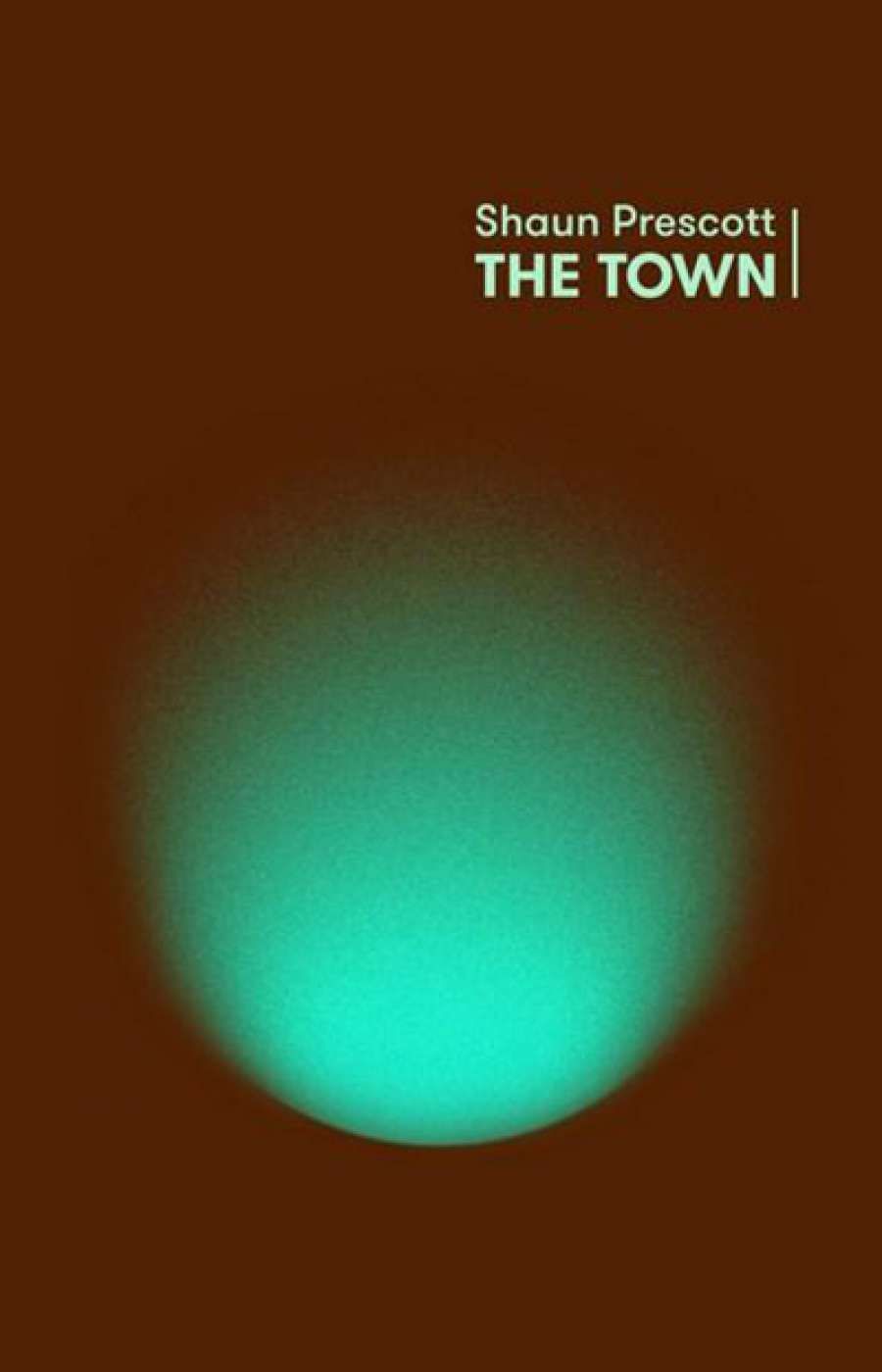
- Free Article: No
- Contents Category: Fiction
- Custom Article Title: Shannon Burns reviews 'The Town' by Shaun Prescott
- Review Article: Yes
- Online Only: No
- Custom Highlight Text:
Shaun Prescott’s début novel shares obvious conceptual territory with the fiction of Franz Kafka and Gerald Murnane, both of whom are mentioned in its promotional material ...
- Book 1 Title: The Town
- Book 1 Biblio: Brow Books, $29.99 pb, 256 pp
The narrator befriends an assortment of eccentrics: a lonely and disenchanted male librarian, a lonely and disenchanted male bus driver (Tom), and a lonely and disenchanted unemployed man (Rick) – all of whom reflect the male narrator’s loneliness and disenchantment. The women in the novel are similarly melancholic, but less passive and pathetic: Ciara is an inquisitive and strong-willed radio announcer, Jenny a no-nonsense publican.
Most of the characters suspect that something has gone awry with their town. Jenny believes that it is in decline, Ciara is convinced that its blank history has rendered the townspeople docile and incurious, and the bus driver claims that ‘nothing in the town was one hundred per cent. There was always a missing fraction ...’ The librarian speculates that ‘the truth of the town was uglier than we could imagine, even if no one knew what it was’, and some townspeople eventually theorise that ‘something bad had happened long before’ and ‘this unknown something was somehow connected’ to their bleak predicament.
Instead of speculating about the town’s deficit, Rick, who spends his days wandering the aisles of Woolworth, embodies its malaise. He is ‘yet to properly cross the transformative threshold’ into meaningful adulthood. This troubles him for a while, but Rick ultimately embraces his deficiencies and resolves to ‘plug’, ‘distort’, and ‘repurpose’ his memories, to reinforce his stunted life.
Late in the novel, a group of men who share the same name threaten the narrator, partly because he is an outsider who fails to behave in an ordinary way, and partly to protect the town against his scrutiny. ‘We now have everything set perfectly in place,’ one of them says, ‘and so nothing needs to happen anymore.’ For these exemplary townsmen, ‘Nothing that happens now here is historical’ (Prescott is a master of tortured phrasing) and ‘History is in the past ... This is what people worked for. Farmers, builders, Anzacs, the lot ... History can end, you know. It doesn’t need to keep going.’
Some readers may genuinely wonder what Prescott is driving at, but most will quickly identify the missing piece of the town’s puzzle, and the reason for its absence. Unlike The Castle or The Plains, The Town’s moral, social, and existential concerns are hard to misidentify.
 Shaun Prescott
Shaun Prescott
The Town’s surreal qualities and peculiar tone will make it compelling enough for many readers, despite the unevenness of Prescott’s prose. The repeated use of the passive voice is arguably fitting, given the narrator’s distinctive passivity, but dozens of sentences exhibit a cockeyed grammar that appears more careless than purposeful. Prescott also, occasionally, uses the wrong word. For instance: ‘I told them everything was true about England, that I could detect it in all of their proximities.’ He must mean ‘whenever I drew close to them’, but the literal meaning of what is written is far more puzzling. Others include: ‘Wherever the hole lead, it must surely arrive back’; and ‘... it was possible in my book to write that the town was suffused with “a barely perceptible sadness”, and it was possible to feel confident, as I was writing this sentence, that it did’. The last word of that final sentence should, of course, be ‘was’, and Prescott clearly means ‘led’ or ‘leads’ in the one before it – but even then the sentence barely conveys what I take to be the intended meaning. The narrative logic is also hard to track. At one point, the narrator (who claims to have forgotten where he comes from) goes for a walk to the edge of the town. ‘At that remove,’ he says,
... the town existed only as a memory, and not a very vivid one. I was unable to remember the specific layout of its streets with any clarity. Only certain building façades came to mind, completely at random, and when I thought about Ciara I couldn’t picture her. She was a name and a series of barely connected facts, and none of these cohered.
Leaving the town means forgetting the town. Because of this – and given that the story is told in the past tense – we have to assume that everything reported about the town was recorded within its boundaries, as material for the narrator’s (seemingly abandoned) book. Yet we encounter exactly the same voice and narrative thread, without any reference to a subsequent loss of memory, after the narrator flees the town, and there are no clues about where or when the latter part of the account is recorded, if it is recorded at all. Perhaps the author abandoned the earlier logic in order to compound The Town’s unsettling effects, but I was more disenchanted than unsettled.


Comments powered by CComment